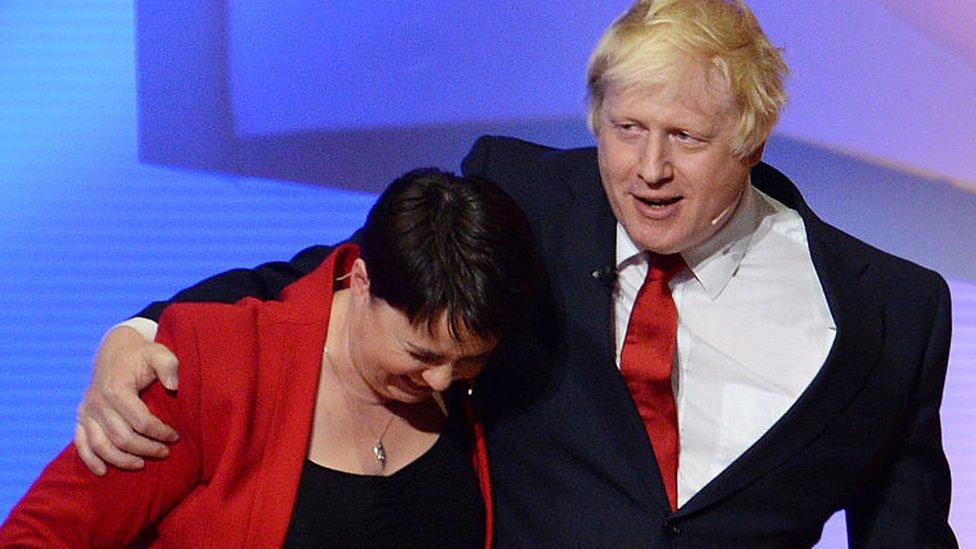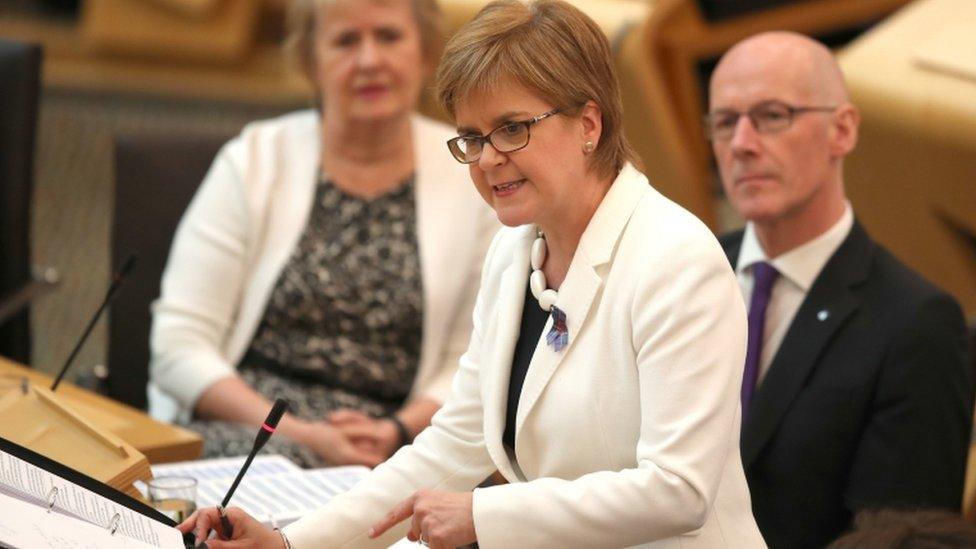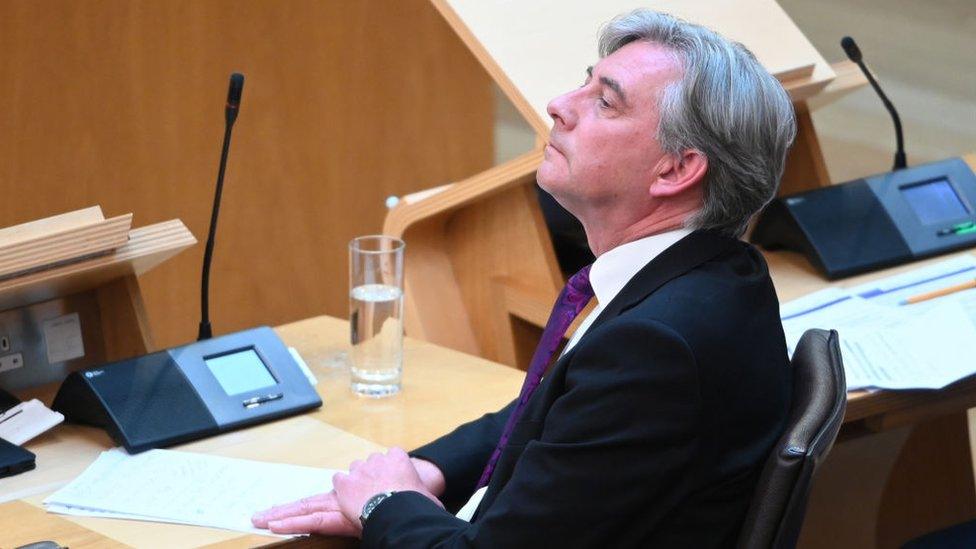First Minister's Questions: One eye on the Tory leadership race
- Published

Ruth Davidson and Boris Johnson famously clashed during the EU referendum campaign, but might they soon be fellow leaders?
It was cupcake day in the Scottish Parliament. Or, more precisely, in the fine wee coffee bar which graces the garden lobby.
There they were, cakes on a plate, defiantly resplendent, tempting alike ambient politicians, staff and members of the wicked media.
Personally, I have never been a fan of braggadocio in bakery. Mostly, I opt for a double espresso, topped up with a little hot water, the closest I can devise to a standard Italian coffee in this realm of gigantic, searingly hot brews.
But others were drawn and so a queue formed, as it often does at thirsty or peckish periods. Thus, I overheard snippets of an intriguing conversation.
One adherent of the governing party vouchsafed to another: "Prime Minister Boris Johnson? Better get used to it, eh?" His companion agreed, with a slight shrug.
For, indeed, the result had not long come through from the first round of voting in the contest to become Conservative Party leader - and thus PM.
Boris Johnson is firmly in the lead, with Jeremy Hunt second and Michael Gove third. Three contenders - Andrea Leadsom, Mark Harper and Esther McVey - polled below the threshold and were eliminated.
Cheryl Gillan announces the result with seven of the 10 candidates making it to round two
So is it all over, bar the shouting, polite but barbed, which characterises these Tory contests? No and yes.
No, because the Stop Boris campaign will presumably coalesce around a couple of candidates, before deciding who is best placed to deter Mr Johnson.
Yes, because it now seems all but certain that Mr Johnson will be one of the final two contenders to be placed before the party membership for ultimate choice.
Should that prove to be the case, it seems likely that a fretful, disquieted party may opt for the seeming certainties of the once bombastic Boris, who now modifies his demeanour with a dose of Uriah Heep.
Ruth Davidson's favoured candidate, Sajid Javid, came a respectable fifth. Enough to keep the head elevated, with little apparent chance of troubling the final outcome.

Nicola Sturgeon said the Tories would be the party of austerity no matter who wins the leadership race
At Holyrood, the Scottish Tory Leader stuck personfully to her devolved task, even as the votes were being counted at Westminster. She could do no other.
Nicola Sturgeon, however, was under no such constraint. While answering the policy questions, in detail, she also poked a sharp stick into the quivering frame of the Tories.
Ms Davidson, she said, led the party of austerity in Scotland. That role, she chided, would not change, regardless of whoever emerges as the party leader in Westminster.
Perhaps in search of solace, Ms Davidson opted to inquire about a topic she has made her own. Subject choice in Scotland's schools.
In truth, the exchanges departed little from last week, when the issue was identical. Ms Sturgeon insisted that school performance was improving - and that it was important to assess the range of subjects across the three upper years of secondary school, not just S4.
But Ms Davidson plainly feels she has found a weak point. One SNP insider suggested to me that this must have been confirmed by Tory focus groups.

Richard Leonard wanted Ms Sturgeon to sign up to a letter about TV licences - to be told her ministers have already sent one
Richard Leonard, for Labour, pursued a single transferable question, on the treatment of pensioners. Firstly, he urged Ms Sturgeon to sign his letter to the UK government urging the retention of free TV licences for all aged over 75, as at present.
You could almost sense Nicola Sturgeon saying "aye, right" to that one. With a light tang of acid in her voice, she informed Mr Leonard that her ministers had already written in such terms to the UK government.
Mr Leonard then reached for the remote and changed channel. He accused the Scottish government of lacking ambition in their declared objective to end fuel poverty.
The exchanges continued for a wee while before Ms Sturgeon produced her principal weapon, the Westminster and Holyrood power balance.
TV licences, energy prices and indeed pensions were all reserved to Westminster, she reminded Mr Leonard. Should he be open to demanding the devolution of these policies, well, then, she would sign that letter.
Thoughts elsewhere?
It was Alison Johnstone's shottie for the Greens and she wanted more cash devoted to GPs, within the overall health service.
If anything, this is even more of a banker than school exams. Pretty well everyone visits a GP at some point, or has a family member who is a regular in surgeries. Not all will have felt they received sufficient attention.
Ms Johnstone said that 11% of health cash should go to GPs. In reply, Ms Sturgeon offered a slightly different diagnosis. 11% was currently devoted to primary care, including GPs. It was important, she argued, to consider the patient - and health practice - in the round.
The exchanges were sound and substantive. But also, somehow, lacking in vigour. Thoughts, inevitably, were elsewhere.
- Published13 June 2019

